| Srl | Item |
| 1 |
ID:
121926
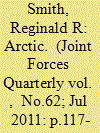

|
|
|
| 2 |
ID:
087182


|
|
|
|
|
| Publication |
2009.
|
| Summary/Abstract |
This article examines the process by which certain coastal states in East and Southeast Asia may confirm their sovereign rights over areas of continental shelf more than 200 nautical miles from their baselines - areas commonly termed the "outer" or "extended" continental shelf. The article provides an overview and explanation of this legally and technically complex process. It also highlights some of the numerous issues and uncertainties in respect of both the interpretation of the relevant provisions of the international law of the sea and practical aspects of the implementation of the process itself. Many states around the world, including in East and Southeast Asia, are striving to meet a deadline for submissions related to the outer continental shelf of May 2009. Existing and potential submissions are outlined. The potential opportunities and challenges associated with outer continental shelf are then discussed.
|
|
|
|
|
|
|
|
|
|
|
|
|
|
|
|
| 3 |
ID:
123140
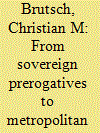

|
|
|
|
|
| Publication |
2013.
|
| Summary/Abstract |
What roles do, can and should cities and their agents play on the international stage? Has the "rescaling" of political authority expanded urban governments' foreign policy space? Can the advocates of urban empowerment exploit cities' growing economic clout to harness urban development? To answer these questions, and to shed light on the international frontiers of metropolitan governance, this study explores the frictions between cities' foreign ambitions and states' collective efforts to preserve their sovereign rights and prerogatives. It proceeds in two parts: to probe the anarchical society's stake in the urban age, the first part maps the transnational activities of cities and their agents. It discusses urban aspirations, surveys foreign engagements and reviews their salience and limitations. To gauge states' collective response to the tentative expansion of metropolitan rule, the second part examines on what terms UN-Habitat, the Cities Alliance and the World Bank harness urban development in poorer and more fragile parts of the world. The study concludes with a critique of the view that international relations are bound to orbit local concerns.
|
|
|
|
|
|
|
|
|
|
|
|
|
|
|
|
| 4 |
ID:
098671
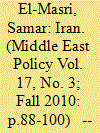

|
|
|
| 5 |
ID:
147730
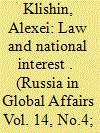

|
|
|
|
|
| Summary/Abstract |
Current events in Europe are causing concern among many Europeans and excitement among political analysts. We are accustomed to an Old World that is a land of prosperity and order, with respect for the law and tranquility. Of course, many things have happened in Europe, but the current situation--from rampant anti-Russian rhetoric and economic sanctions, to helplessness in the face of an influx of newcomers, not always invited and not willing to live according to European rules--is perplexing.
|
|
|
|
|
|
|
|
|
|
|
|
|
|
|
|
| 6 |
ID:
137763
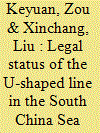

|
|
|
|
|
| Summary/Abstract |
The U-shaped line in the South China Sea has been recently challenged in the international community and this challenge reached its climax when the Philippines presented China with a Notification and Statement of Claim under Article 287 and Annex VII of the 1982 United Nations Convention on the Law of the Sea (LOS Convention) on 22 January 2013. In its Statement of Claim, the Philippines requests the Annex VII Arbitral Tribunal to adjudge and declare that China's maritime claims based on the U-shaped line are contrary to the LOS Convention and invalid. Against this background, this article will analyze the issues concerning the related submissions of the Philippines.
|
|
|
|
|
|
|
|
|
|
|
|
|
|
|
|
| 7 |
ID:
126111


|
|
|
|
|
| Publication |
2013.
|
| Summary/Abstract |
The Arctic is beginning to test the stage-managed optics of China and Russia's 'strategic partnership'. Friction was most recently on display after the Arctic Council's May 2013 decision to confer permanent observer status on Beijing. The Chinese media celebrated the move as an affirmation of the nation's 'legitimate rights' in Arctic affairs.1 Russian officials were much less enthusiastic. Following the decision, Russian Prime Minister Dmitry Medvedev quickly reminded China that 'Arctic states lay down the rules here'.2 In fact, Russia was the primary force in obstructing China's observer status application for nearly seven years. It was only after considerable pressure from Nordic nations and a 2011 change, which required new observers to 'recognize Arctic states' sovereignty, sovereign rights and jurisdiction in the Arctic', that Moscow reluctantly approved the move.3 Interestingly, Russia is ostensibly China's strongest partner in the eight-member Arctic Council. The observer status episode revealed a rare fracture in a relationship which both sides have taken great care to cultivate as trouble-free. Indeed, recent Sino-Russian policy synchronisation on Syria and Iran, among other issues, has led Richard Weitz to assert that bilateral relations between Russia and China are at an all time high.4 However, Arctic climate change presents a challenge for these bilateral relations. Long-suppressed disagreements concerning access to sea lanes, fisheries and energy resources are quickly gaining practical application as sea ice cover diminishes. This article examines Sino-Russian interaction in the Arctic and concludes that, notwithstanding present differences, several factors suggest that cooperation will prevail.
|
|
|
|
|
|
|
|
|
|
|
|
|
|
|
|